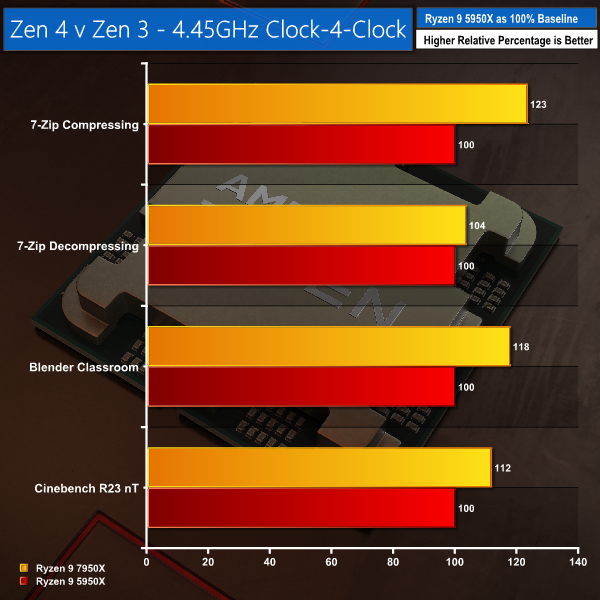We wanted to look at a clock-for-clock comparison to make a quick assessment on the Zen 4 architectural performance versus Zen 3. As such, we glued both 16-core chips – the Ryzen 9 7950X and Ryzen 9 5950X – to 4.45GHz and ran a few benchmarks.
7-Zip compression was particularly favourable towards the new 16-core part with a 23% relative performance lead, but this will have also been skewed heavily by higher-bandwidth DDR5 memory.
7-Zip decompression was far less favourable and doesn’t seem to put forth a particularly high uptick for Zen 4.
Rendering seldom places significant emphasis on memory bandwidth in Blender. As such, the 18% clock-for-clock performance lead observed by the new 16-core processor is a pretty reasonable depiction of the Zen 4 vs Zen 3 improvements.
And Cinebench R23 nT with a 12% increase emphasises this Zen 4 vs Zen 3 comparison further.
The clock-for-clock comparison between Zen 3 and Zen 4 is interesting. Clearly, new, high-bandwidth DDR5 memory skews the results a little. But our testing does indicate that the new Ryzen 9 7950X is double-digit percentage points better than the Ryzen 9 5950X it replaces in tasks such as multi-core rendering.
 KitGuru KitGuru.net – Tech News | Hardware News | Hardware Reviews | IOS | Mobile | Gaming | Graphics Cards
KitGuru KitGuru.net – Tech News | Hardware News | Hardware Reviews | IOS | Mobile | Gaming | Graphics Cards


